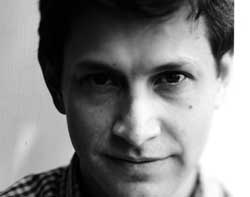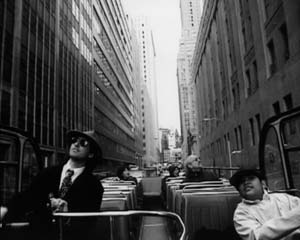ACCIDENTAL TOURIST
Timothy "Speed" Levitch, the subject of Bennett Miller’s debut feature, The Cruise, blurs the documentary form – not between truth and reality, but between education and entertainment. Adam Pincus speaks to Miller on capturing the dizzy verbal velocity of Levitch and his cruises.
Timothy "Speed" Levitch in a scene from The Cruise
What to say about The Cruise, a 76-minute documentary about a Manhattan tour guide, Timothy "Speed" Levitch, the hyperbolically verbal subject of the film hasn’t already said for himself? It’s a movie where mundane reality barely gets a word in edgewise, but truth – the kind that’s screamed out in capital letters – is outspoken. The film is a documentary, yes, but one wholly charged with subjective portraiture.
For a movie shot on video, The Cruise has a lovely elegiac look, its mood heightened by a black & white transfer, blown-out exposures and canny use of the ’50s cool jazz of Stan Getz and Chet Baker. But the anachronistic tone, a dreamy reverie for classic New York, the New York of literary renegades, action painting and whiskey drinks, comes into friction with the pixilated swim of digital video. It’s a tension embodied by Speed himself, with his references to Thespus and the Kabbalah, the old school and the New Age.
After three-and-a-half years of production and a strange ride on the festival circuit (it was rejected by many before having its raucous, revelatory premiere at the Los Angeles Independent Film Festival), The Cruise was picked up for theatrical distribution by Artisan Entertainment, and is slated for an October release. Director Bennett Miller and Speed are in talks with a publisher for a Cruise book, one that would incorporate photography from the film with transcripts as well as some of Speed’s personal writings on New York City. It’s a small phenomenon, this low-fi, unpredictable documentary.
I ask Bennett how the movie came to be. He’s vague about it. "It’s all really murky," he says. "Because I think I was in a very murky place in my life. I was sort of bullshitting around and not particularly happy with anything I was doing, and I began to flirt with the idea of documentary filmmaking. I had done a couple of short pieces – documentary pieces for hire, corporate industrials – and liked the work." As it happened, Bennett’s brother had a friend who was a tour guide, Timothy Levitch, nicknamed Speed, an oddball of a guy, a real talker. Bennett took a tour. The two became friends. "I encountered Speed, and as I got to know him and as I gravitated towards his being, it was nothing that ever required deep thinking." Bennett elaborates: "I saw him, I saw where I was at in my life, I knew what my capabilities were, and it was just a matter of course. It felt very organic, like I would very much like to disappear into this person’s reality – like a scuba diver might jump into the ocean with all this equipment I had on – and just immerse myself in that and then come out and see what that yields. But it was never like, ‘Oh, this is a good idea,’ or ‘Maybe I should do a documentary on a tour guide, that would be wonderful.’ Or anything like that. It was an incredibly thoughtless conception." The laissez-faire approach – one in which the first 100 hours of footage was scrapped, and the film was begun anew – was only made possible by Bennett’s low-impact methods. He got a "prosumer" video camera, a wireless microphone and a Sennheiser shotgun mike — a compact little rig that fit into an average-sized backpack, and started filming, accompanying Speed on his endless circles of Manhattan, taking in his prolix shtick. He became a silent participant in "the cruise," voyeur and witness.
 |
| Director Bennett Miller |
Of course, little seems unorthodox to Speed when it comes to cruising. He performs a fascinating brand of guided tour for his captive, baffled tourists, one dense with literary landmarks, Byzantine commentary on the nature of civilization and human existence. New York City is a vengeful lover, full of mystery and history and spite. It’s a bus tour like no camera-clutching tourist is likely to expect. But as much as he performs this rhapsodic New York story, Speed is equally involved in an act of self-invention. The film is filled with winding monologues, addressed solely to the camera. "I think he does have a propensity toward performance," says Bennett, "as is the case with many detached, alienated loners of society. It’s sometimes more difficult for them to relate openly, interpersonally." Gauging from the film, openness is not Speed’s problem. But when I ask him what he fears the most, he answers, "Intimacy, probably like everyone else." Coming from such an extravagant extrovert, it’s hard to believe. "It is a dynamic battlefield, intimacy," he says. "I often think that the entire organization around us that we familiarly call society has been arranged to keep us all from staring into each other’s eyes. And I feel that every day: my own terror. At the same time, the great ecstasies of my life are being close to people, connecting to people."
In fact, one of the most poignant things about The Cruise is its suggestion of just such a connection. The film is equally a portrait of Timothy Speed Levitch and the vision of a relationship between Bennett and Speed – the watcher and the watched. You might say this is inevitable. Speed takes it further: "It reminds me of Leonardo Da Vinci’s one-liner which Picasso then sampled, which is ‘Every portrait is a self-portrait.’ Bennett Miller is also illustrating clarities in his own life by spending so much time focusing his lens on me. I do think to some degree the film is a dissertation on this very discussion, this attempt to introduce how difficult it is in this life to really get to know somebody.
"At the Docfest, in the Q & A, there was a man who made the comment that he felt that he didn’t get to know the character on screen very well. And there was even a little bit of fury in his voice – he was kind of unnerved by this. What kind of documentary is this? Well, of course, what he’s really upset about is – That’s life! You sit next to somebody for years and you think you know them, and then one day they say something, they do something, and you realize you never did know them."
Epistemological issues aside, there are other reasons for The Cruise’s lack of the kind of specific biographical detail one might expect of the form. "Often the film is purposely losing focus on the details of my own existence to focus instead on the audience," says Speed. "By losing focus on me, the audience can put focus on himself, herself, itself. This often makes them furious." Bennett concurs: "I’m a lot more interested in questions than answers. People get frustrated and agitated when you leave them with their curiosity. As Speed puts it, the people who want to know these details are the same people who want to know exactly how high the Empire State Building is." There’s a scene late in the film with Speed outside the criminal courts building, in which he takes a long riff on the notion of "anti-cruise." The story revolves around Speed’s arrest; his mug shot, looking suitably wild-eyed, fills the screen. Yet again the details — the basic facts of crime and punishment – are elided, conspicuous by their absence. I ask Bennett just what Speed was doing in the clink, but he won’t say. Later, when I tell Speed that this scene begs the question, he answers, "Don’t you think it begs that question because, if the audience member has that specificity, he has excluded himself from the anecdote? Without that detail, he is also one step away from prison. He also has to understand what incarcerates him on a daily basis, the moments of his day when he is in a prison cell."
The Docfest audience member’s frustration does point out the degree to which The Cruise flouts expectations as a documentary. "It’s like Strindberg as opposed to Ibsen," says Speed. "You know, Strindberg had a portrait of Ibsen over his desk, and Ibsen had a portrait of Strindberg over his desk, and they both mutually agreed to hate each other. And what they essentially disagreed on was that one decided play writing was a character-driven machinery and the other decided it was essentially a matter of plot. And I say ‘Strindberg as opposed to Ibsen,’ because there are so many points in the piece, don’t you think, where Bennett and [editor] Michael Levine were striving for the deeper sorrows and the deeper laughter of this Speed Levitch character, rather than that he was 5 feet 7 inches tall and works four days a week and has a sublet on Cornelia Street."
It’s funny to hear Speed refer to himself in the third person. There is a high degree of persona, Speed as this character "Speed," throughout the film, and it’s interesting – if unknowable — to consider what is innate to the man and what is a collusive, creative act between Timothy Levitch and the filmmaker. "When I watch the film, especially lately," says Speed, "I have experienced a real profound detachment, and really watched it up there on the screen detached from it emotionally, not really knowing what was going to happen next." As rendered by the film, this character is more surprising than fiction, more articulate than screenwriting, and that may be what attracted Artisan Entertainment to acquire The Cruise. Artisan is releasing four films this Fall, three of which are narrative films, works of fiction. John Hegeman, Artisan’s Executive Vice President of Theatrical Marketing, has referred to The Cruise as "Slacker meets Shine." It’s an interesting way of thinking about a documentary, one with a certain commercial zip to it, as if it were "based on a true story." If Speed played basketball, would Hegeman reference Hoop Dreams? Or Hoosiers?
VOD CALENDAR


 See the VOD Calendar →
See the VOD Calendar →



